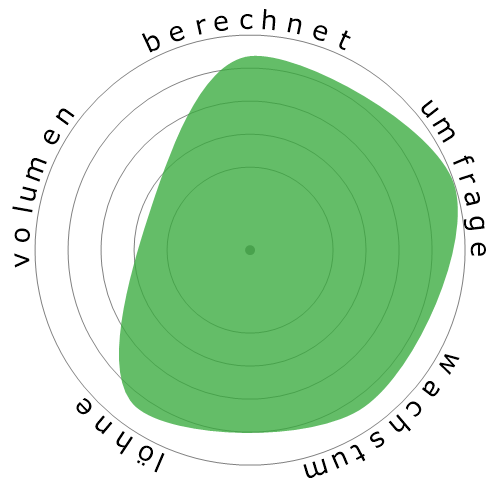Tierärzte
Wohin möchten Sie als Nächstes gehen?
Oder erkunden Sie diesen Beruf ausführlicher...


Was zeigt diese Schneeflocke?
Was ist das?
Wir bewerten Jobs anhand von vier Faktoren. Diese sind:
- Chance der Automatisierung
- Jobwachstum
- Löhne
- Anzahl der verfügbaren Stellen
Dies sind einige wichtige Punkte, über die man beim Jobsuchen nachdenken sollte.
Personen haben sich auch angesehen
Berechnetes Automatisierungsrisiko
Minimales Risiko (0-20%): Berufe in dieser Kategorie haben eine geringe Wahrscheinlichkeit, automatisiert zu werden, da sie in der Regel komplexe Problemlösungen, Kreativität, starke zwischenmenschliche Fähigkeiten und ein hohes Maß an manueller Geschicklichkeit erfordern. Diese Jobs beinhalten oft komplexe Handbewegungen und präzise Koordination, was es für Maschinen schwierig macht, die erforderlichen Aufgaben zu replizieren.
Weitere Informationen darüber, was dieser Wert ist und wie er berechnet wird, sind verfügbar hier.
Benutzerumfrage
Unsere Besucher haben abgestimmt, dass es eine geringe Chance gibt, dass dieser Beruf automatisiert wird. Diese Einschätzung wird weiterhin durch das berechnete Automatisierungsrisiko unterstützt, welches eine 7% Chance der Automatisierung schätzt.
Was denken Sie, ist das Risiko der Automatisierung?
Wie hoch ist die Wahrscheinlichkeit, dass Tierärzte in den nächsten 20 Jahren durch Roboter oder künstliche Intelligenz ersetzt wird?
Gefühl
Das folgende Diagramm wird angezeigt, wenn genügend Stimmen vorhanden sind, um aussagekräftige Daten zu erzeugen. Es zeigt die Ergebnisse von Nutzerumfragen im Laufe der Zeit und bietet einen klaren Hinweis auf Stimmungstrends.
Gefühlslage über die Zeit (vierteljährlich)
Gefühlslage über die Zeit (jährlich)
Wachstum
Die Anzahl der 'Veterinarians' Stellenangebote wird voraussichtlich um 19,1% bis 2033 steigen.
Gesamtbeschäftigung und geschätzte Stellenangebote
Aktualisierte Prognosen sind fällig 09-2025.
Löhne
Im Jahr 2023 betrug das mittlere Jahresgehalt für 'Veterinarians' 119.100 $, oder 57 $ pro Stunde.
'Veterinarians' wurden 147,8% höher bezahlt als der nationale Medianlohn, der bei 48.060 $ lag.
Löhne über die Zeit
Volumen
Ab dem 2023 waren 78.220 Personen als 'Veterinarians' in den Vereinigten Staaten beschäftigt.
Dies entspricht etwa 0,05% der erwerbstätigen Bevölkerung im ganzen Land.
Anders ausgedrückt, ist etwa 1 von 1 Tausend Personen als 'Veterinarians' beschäftigt.
Stellenbeschreibung
Diagnose, Behandlung oder Forschung von Krankheiten und Verletzungen bei Tieren. Beinhaltet Tierärzte, die Forschung und Entwicklung durchführen, Nutztiere inspizieren oder sich um Haustiere und Begleittiere kümmern.
SOC Code: 29-1131.00
Kommentare (56)
In conclusion, STOP BEING LAZY! STUDY, WORK, and use AI to help in minimal cases, not in every aspect of your life.
Moving on. When you mention determining the age of a stray dog, you don't necessarily need to know their exact age to provide treatment or make certain diagnoses. As for your comment about "probably not knowing how much to feed each one," AI and robotics are astonishingly accurate in this aspect. They'll likely always have more data and accuracy than we do. And the notion that "they can't bathe them because they are robots"? Well, we've had waterproof robots for quite some time now.
So, yes, it seems full automation is on the horizon!
Those apps are just going to give rise to pet owners who doubt the doctor's diagnosis, and they are going to make irresponsible decisions thinking that they can treat their pets' ailments. In fact, it has already happened many times.
I work at a veterinary clinic, and there have been many "self-proclaimed veterinarians" with a degree in Google misdiagnosing their pets and giving harmful medications, such as feeding paracetamol to their dogs with high fever.
The app should be restricted to be used by licensed veterinarians and veterinary students, so as to prevent any misinformed or uneducated pet owners from misinterpreting or abusing the information from the apps.
In addition, some owners may have received the correct diagnosis from the app, but may proceed with the wrong treatment. A rise in antibiotic resistance will be observed when owners simply use antibiotics without understanding its consequences.
In fact, this is already happening without the involvement of AI. There are many online sellers selling antibiotics, and even some irresponsible people selling sedatives online, labeling such medications as "cat/dog fever medication" or "cat parvovirus medication".
Auf Kommentar antworten